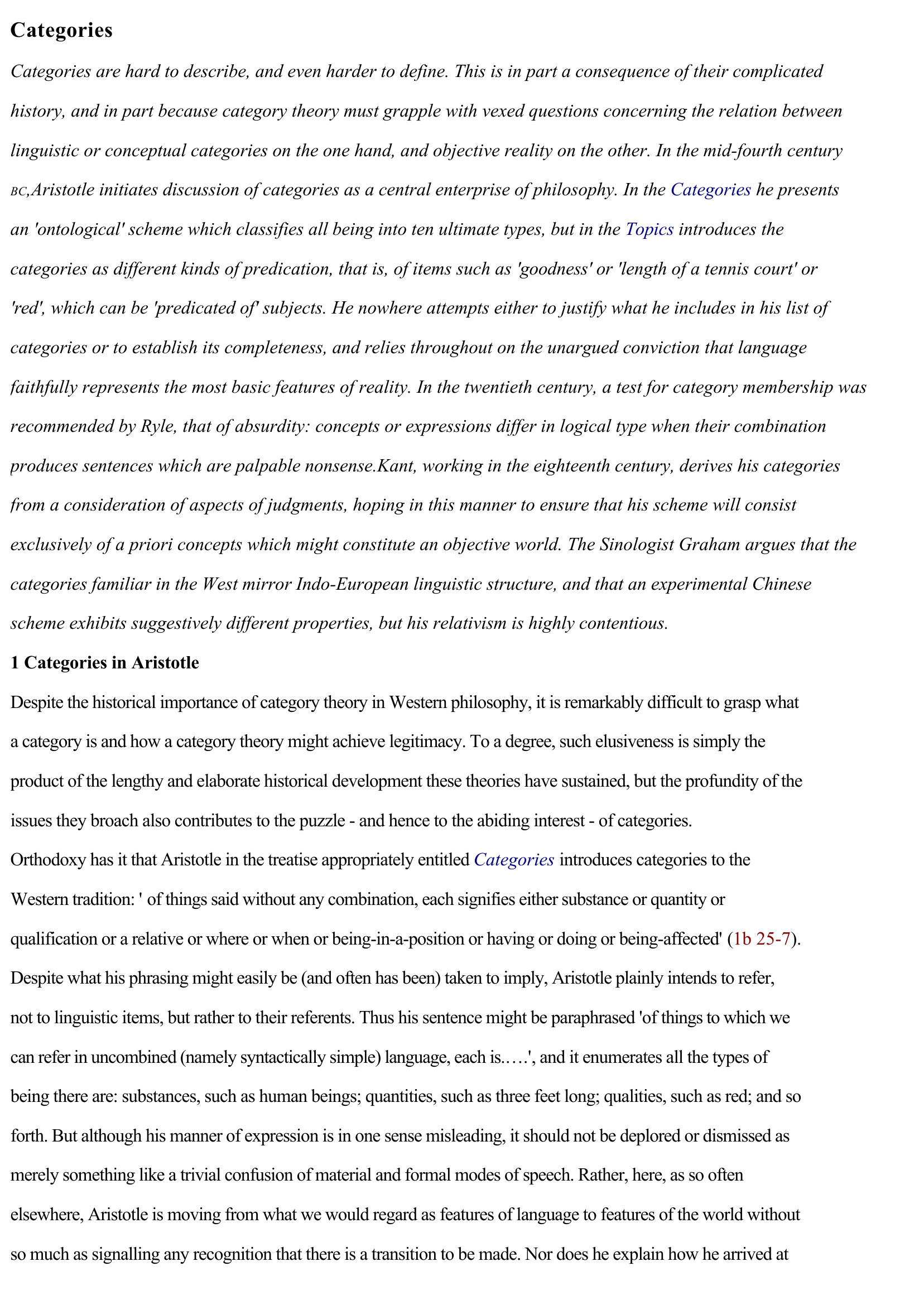Categories
Extrait du document
Categories are hard to describe, and even harder to define. This is in part a consequence of their complicated history, and in part because category theory must grapple with vexed questions concerning the relation between linguistic or conceptual categories on the one hand, and objective reality on the other. In the mid-fourth century BC,Aristotle initiates discussion of categories as a central enterprise of philosophy. In the Categories he presents an 'ontological' scheme which classifies all being into ten ultimate types, but in the Topics introduces the categories as different kinds of predication, that is, of items such as 'goodness' or 'length of a tennis court' or 'red', which can be 'predicated of' subjects. He nowhere attempts either to justify what he includes in his list of categories or to establish its completeness, and relies throughout on the unargued conviction that language faithfully represents the most basic features of reality. In the twentieth century, a test for category membership was recommended by Ryle, that of absurdity: concepts or expressions differ in logical type when their combination produces sentences which are palpable nonsense. Kant, working in the eighteenth century, derives his categories from a consideration of aspects of judgments, hoping in this manner to ensure that his scheme will consist exclusively of a priori concepts which might constitute an objective world. The Sinologist Graham argues that the categories familiar in the West mirror Indo-European linguistic structure, and that an experimental Chinese scheme exhibits suggestively different properties, but his relativism is highly contentious.
«
Categories
Categories are hard to describe, and even harder to define.
This is in part a consequence of their complicated
history, and in part because category theory must grapple with vexed questions concerning the relation between
linguistic or conceptual categories on the one hand, and objective reality on the other.
In the mid-fourth century
BC,Aristotle
initiates discussion of categories as a central enterprise of philosophy.
In the Categories he presents
an 'ontological' scheme which classifies all being into ten ultimate types, but in the Topics introduces the
categories as different kinds of predication, that is, of items such as 'goodness' or 'length of a tennis court' or
'red', which can be 'predicated of' subjects.
He nowhere attempts either to justify what he includes in his list of
categories or to establish its completeness, and relies throughout on the unargued conviction that language
faithfully represents the most basic features of reality.
In the twentieth century, a test for category membership was
recommended by Ryle, that of absurdity: concepts or expressions differ in logical type when their combination
produces sentences which are palpable nonsense.Kant, working in the eighteenth century, derives his categories
from a consideration of aspects of judgments, hoping in this manner to ensure that his scheme will consist
exclusively of a priori concepts which might constitute an objective world.
The Sinologist Graham argues that the
categories familiar in the West mirror Indo-European linguistic structure, and that an experimental Chinese
scheme exhibits suggestively different properties, but his relativism is highly contentious.
1 Categories in Aristotle
Despite the historical importance of category theory in Western philosophy, it is remarkably difficult to grasp what
a category is and how a category theory might achieve legitimacy.
To a degree, such elusiveness is simply the
product of the lengthy and elaborate historical development these theories have sustained, but the profundity of the
issues they broach also contributes to the puzzle - and hence to the abiding interest - of categories.
Orthodoxy has it that Aristotle in the treatise appropriately entitled Categories introduces categories to the
Western tradition: ' of things said without any combination, each signifies either substance or quantity or
qualification or a relative or where or when or being-in-a-position or having or doing or being-affected' (1b 25-7).
Despite what his phrasing might easily be (and often has been) taken to imply, Aristotle plainly intends to refer,
not to linguistic items, but rather to their referents.
Thus his sentence might be paraphrased 'of things to which we
can refer in uncombined (namely syntactically simple) language, each is.….', and it enumerates all the types of
being there are: substances, such as human beings; quantities, such as three feet long; qualities, such as red; and so
forth.
But although his manner of expression is in one sense misleading, it should not be deplored or dismissed as
merely something like a trivial confusion of material and formal modes of speech.
Rather, here, as so often
elsewhere, Aristotle is moving from what we would regard as features of language to features of the world without
so much as signalling any recognition that there is a transition to be made.
Nor does he explain how he arrived at.
»
↓↓↓ APERÇU DU DOCUMENT ↓↓↓

































